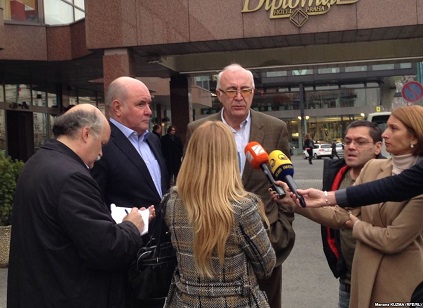Georgia-Russia envoys discuss trade suspension

Georgia’s special envoy Zurab Abashidze and Russia’s Deputy Foreign Minister Grigory Karasin held a phone conversation today that discussed Russia’s suspension of its bilateral free trade agreement with Georgia.
Abashidze said the reason for Russia’s decision was because of the Customs Union – a union of Belarus, Kazakhstan and Russia which gathered ex-Soviet states into a free trade zone to rival the European Union (EU).
"Georgia is not the member of the Customs Union. The issues are as following: For countries that are members of the organisation, Russia vindicates the free trade regulations. But for all other countries, Russia will trade under World Trade Organisation (WTO) regulations,” Abashidze told journalists after the phone conversation.
The Georgian Diplomat highlighted Georgia was "neither a member of the Customs Union nor a member of the Commonwealth of Independent States (CIS)” and Georgia would continue trading with Russia following WTO guidelines.
The Customs Union established on January 1, 2010, and started operating under a comprehensive customs code in July 2011.
After his conversation with the Russian envoy, Abashidze said future consultation had been planned with Russia and details about the terms of ending its free trade deal with Georgia would be decided.
Meanwhile, once Georgia’s free trade deal with Russia ends, tariffs will be imposed on exported products from both countries. Georgia’s Finance Minister Nodar Khaduri believed tariffs would be imposed on products imported from Russia too.
"Tariffs will create additional hurdles for trade and [Georgia] will start following the regulations we currently have with European member countries, China and others,” Khuaduri said.
He highlighted Georgia expected to receive additional 12-15 million GEL from tariffs taxes.
Tbilisi officials believed Russia’s suspension of its bilateral free trade agreement with Georgia was "not a big tragedy”.Furthermore, when the news was announced yesterday, Abashidze said the move was "expected”.
"Russia could move to suspend free trade with Georgia following Georgia’s signing of the Association Agreement (AA) and the Deep and Comprehensive Free Trade Area (DCFTA) Agreement with the European Union (EU), which is due to come into force on September 1 this year,” Abashidze said on July 31.
Meanwhile, Georgia resumed wine exports to Russia in 2013 for the first time since 2006 embargo.
Exports of Georgian mineral water, fruits and vegetables were approved to be sold on the Russian market and will begin to be exported soon. Data from state statistics office Geostat revealed in the first quarter of 2014, Russian exports composed 9.4 percent of Georgia’s total exports.
 Tweet
Tweet  Share
Share